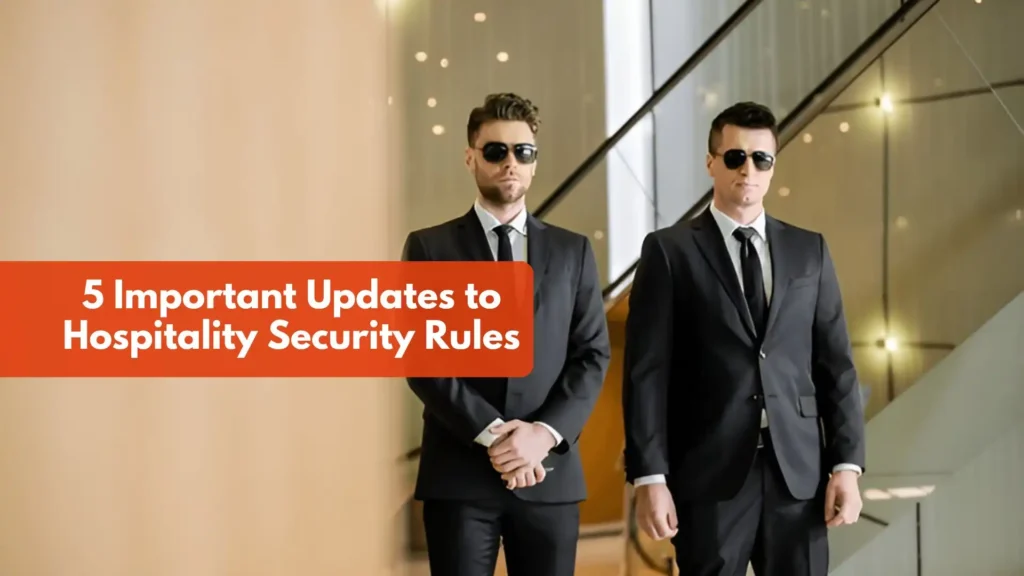The hospitality and leisure industry is one of the UK’s most loved and essential sectors. From busy high streets to lively city centres, these businesses play a key role in creating vibrant and welcoming communities. Along with their cultural importance, the hospitality sector adds significant value to the economy, contributing around £71.3 billion and providing jobs for about 2.5 million people across the country.
Because of its importance, keeping hospitality venues safe and secure is a major priority. However, staying updated with changing rules can be challenging. As security requirements evolve, businesses need to stay informed and ready to meet new expectations. At Guard Mark Security, we have been keeping a close eye on the latest updates to hospitality security rules to help businesses stay on track.

In this article, we outline the key changes that every hospitality business should know and suggest practical solutions to help you adjust to the growing security needs of the industry.
Table of Contents
Why Do Security Rules Change?
There are several reasons why security rules might change. One of the most straightforward reasons is advancements in technology. For instance, we’re seeing the increasing use of AI-powered systems and biometric scanners for access control and restricted areas across various premises nationwide.
Rules can also change in response to significant events or ongoing challenges. A notable example is the tragic Manchester Arena bombing on May 22, 2017, which prompted stronger security planning measures to prevent similar incidents.
Ongoing challenges, such as crimes related to alcohol and drugs, public disorder, and antisocial behaviour, also lead to investigations into root causes. These enquiries often result in new measures designed to reduce risks and improve safety.
Ultimately, security rules evolve to protect the public, businesses, and visitors more effectively. While they can serve as a preventive step, they are often introduced to address the lessons learned from past incidents, as seen in the case of the Manchester Arena bombing. With this context in mind, let’s explore the specific changes in security rules that will impact the hospitality and leisure sector.
5 Major Changes Affecting Hospitality Security
Here are five important changes set to transform how the hospitality and leisure sectors handle security:
1- The Anticipated Introduction of Martyn’s Law
First proposed in 2019, Martyn’s Law is a legislative initiative aimed at enhancing public safety, particularly for event attendees, by addressing the persistent risks of terrorism. This law was developed following the tragic Manchester Arena bombing after the Ariana Grande concert on May 22, 2017.
Driven by Figen Murray, the mother of Martyn Hett (one of the 23 victims of the bombing) the law seeks to implement stricter safety measures for event venues and establish more thorough security checks.
As of March 2024, discussions surrounding the final stages of Martyn’s Law are ongoing at the governmental level. While the timeline for its implementation remains unclear, industry experts expect it to gain widespread acceptance in the coming months and progress through the necessary legal procedures.
Martyn’s Law aims to enhance readiness and strengthen security protocols within the hospitality and leisure industry’s diverse events calendar. Here’s what businesses can expect:
Improved Counter-Terrorism Training
The law emphasises the importance of comprehensive training for security personnel at larger venues and tailored support for smaller venues, helping staff respond effectively to potential threats.
Clearer Emergency Procedures
By providing detailed guidelines for handling critical incidents, including evacuation and lockdown protocols, the law seeks to ensure venues are better prepared for emergencies.
Enhanced Compliance Monitoring
Regulators will regularly review and ensure adherence to the requirements of Martyn’s Law, streamlining compliance processes and offering ongoing guidance.
These measures, supported by Security Minister Tom Tugendhat, have been described as “simple steps that save lives.” While they may seem challenging initially, they are essential for ensuring the safety of guests and staff alike.
2- Stricter Regulations on Alcohol and Spiking
Until recently, the laws surrounding drink spiking were unclear and lacked enforcement. However, with over 6,700 reported spiking incidents in 2023, along with countless unreported cases, significant changes are now being made to address this serious issue. In December 2023, the Home Office introduced new measures aimed at kerbing spiking incidents and improving overall safety.
These measures include better-coordinated police actions to address the impacts and aftermath of spiking, particularly during peak times of the year. Additionally, initiatives have been launched to educate young people about the dangers of spiking and how to stay safe. Legal changes are also underway, introducing stricter penalties for offenders to deter such behaviour.
Victims of spiking now have access to more support services, including tools for anonymous reporting, making it easier for individuals to come forward. Updated guidelines specifically addressing spiking have been issued to ensure that this issue is taken seriously at all levels.
For the hospitality industry, one of the most critical changes involves enhanced training for door staff. Security personnel are now trained to identify individuals who may have been spiked and spot potential perpetrators before incidents occur. At Guard Mark Security, we ensure that all our staff are well-equipped to handle these situations, providing a safer environment for everyone in a busy venue.
3- Changes to Alcohol Duties in Scotland
Although not directly linked to security, the upcoming changes to Scotland’s alcohol pricing rules are expected to have a ripple effect across the hospitality sector, including its security requirements. From April 24, 2024, the Minimum Unit Pricing (MUP) for alcohol was increased from 50 pence to 65 pence.
This adjustment is part of broader measures aimed at addressing Scotland’s alcohol-related challenges, including proposed restrictions on advertising alcohol on TV, billboards, and sports sponsorships. While these changes primarily impact supply chains for venues such as restaurants, pubs, and bars, there are likely to be indirect consequences for venue security, especially during the initial adjustment period.
With the BBC’s estimated 30-pence increase in the price of an average can of lager, customers may react differently to these pricing changes. Venues should anticipate potential disruptions or conflicts, especially in the early stages of implementation. As a result, reinforcing security measures or increasing staff presence during this transition period is a crucial step to ensure a safe and welcoming environment.
4- Upcoming Developments for Scottish Pubs
In addition to changes in alcohol duties, further updates are expected regarding the Tied Pubs Act (Scotland) 2021, a law designed to regulate the relationship between pub tenants and landlords. Initially delayed by legal challenges, this act is back on the legislative agenda with more clarity.
The act aims to give pub tenants greater control over their establishments and establish fairer practises between landlords and tenants. While its primary focus is on ownership and operational rights, the changes could also influence customers and how pubs operate. For larger establishments or venues with a loyal customer base, these developments might require adjustments in management or operational practises.
For hospitality venues, staying prepared is key. Potential impacts on pricing, operations, or customer expectations could lead to a need for additional security personnel to manage increased footfall or any unforeseen issues during the transition. At Guard Mark Security, we specialise in providing adaptable security solutions to help businesses navigate such changes smoothly.
5- New Registration Rules for Welsh Holiday Homes
While not directly tied to security, upcoming regulations for holiday homes in Wales are worth noting for those in the hospitality industry. Moreover, the Senedd is expected to introduce legislation to regulate holiday homes and second properties across the country.
According to reports from BBC, The proposed changes aim to enhance safety, improve visitor experiences, and ensure future holidaymakers can enjoy safe and regulated accommodations. This will particularly impact services like Airbnb, which have operated with fewer regulations in the past.
In the short term, these rules might lead to a decline in guest numbers as the industry adjusts, which could affect budgets for security and other operational areas. Without proper planning, this could present challenges for hospitality venues. However, by working with experienced security providers like Guard Mark Security, businesses can tailor their hospitality security plans to meet these new demands effectively.
Best Security Guarding Services in Yorkshire
While the changes in legislation and regulations for the hospitality and leisure sector may seem overwhelming, they don’t have to be a cause for concern. With Guard Mark Security, you can rest assured that your business will always be ahead of the curve, no matter what new laws or rules come into effect.
Our team has extensive experience securing all kinds of hospitality venues, from bustling hotels and vibrant pubs to cosy cafes and large-scale events. As the best security provider in Yorkshire, we pride ourselves on offering tailored solutions that not only comply with the latest regulations but are also designed specifically to meet your unique needs.
Each security plan we provide is customised, ensuring you receive the right services for your business. Our professionally trained staff is available 24/7, 365 days a year, giving you peace of mind at all times. Whether you need static guards, mobile patrols, or specialised event security, we’ve got you covered. With our proven track record and commitment to excellence, we are dedicated to providing high-quality services that keep your business safe and secure.
If you have any questions in mind, our highly skilled and expert customer support team is here all the time. Contact us now, share your security requirements with us, and we will help you create a customised and unbreakable security plan for your business establishment.

